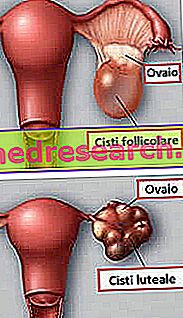Definition
Infalite is a chronic inflammatory disease of infectious origin that affects the navel.
Infalite affects mainly infants and children, but sometimes it can also affect adults.
The patients most at risk for the development of infalitis are above all those hospitalized and subjected to invasive procedures and / or those with compromised immune systems.
Causes
In most cases, defalite is caused by a polymicrobial infection sustained by both Gram-positive and Gram-negative bacteria. More rarely, defalite is caused by a single type of microorganism.
The bacteria most involved in the development of the infection are: Staphylococcus aureus, Streptococcus pyogenes, Escherichia coli, Klebsiella pneumoniae and Proteus mirabilis .
Symptoms
The typical symptoms caused by the infalite consist of: formation of a purulent and foul-smelling secretion in the navel, edema, periombelical erythema, pain and burning.
Furthermore, premature infants with omphalitis may also experience jaundice, tachycardia and hypotension.
If not properly treated, malaria can be complicated and give rise to other serious pathologies - such as necrotizing fasciitis, sepsis, myonecrosis and septic embolization - which, in the most tragic cases, can then lead to the death of the patient.
The information on Ophthalitis - Drugs for the treatment of Onfalite are not intended to replace the direct relationship between health professional and patient. Always consult your doctor and / or specialist before taking Onfalite - Onfalite Treatment Medications.
drugs
Since malaria is a disease on an infectious basis, its treatment involves administering topical and / or systemic antibiotic drugs. It is clear, therefore, how important it is to identify which micro-organisms have triggered inflammation, so as to be able to establish a suitable and specific antibiotic therapy.
Penicillins are particularly effective against mild omphalitis sustained by Staphylococcus aureus and Streptococcus pyogenes .
Aminoglycoside antibiotics are indicated to counteract the Gram-negative bacteria that may be involved in the development of the infection.
For invasive omphalitis, on the other hand - in particular, those triggered by anaerobic bacteria - antibiotic associations are used in which metronidazole is also present.
Generally, treatment with antibiotics should continue for about 10-15 days. However, the doctor will determine the optimal duration of treatment for each patient.

penicillins
As mentioned, penicillins are particularly effective in eradicating Gram-positive bacteria - such as Streptococcus pyogenes and Staphylococcus aureus - often involved in the onset of defalite. Although, indeed, some broad-spectrum penicillins may also be useful in counteracting the Gram-negative bacteria implicated in the infection.
Among the various active ingredients that can be used, we recall:
- Oxacillin (Penstapho ®): oxacillin belongs to the class of resistant β-lactamase penicillins and is indicated for the treatment of infections caused by Gram-positive bacteria.
It is a drug available for intravenous administration. The exact amount of medicine to be administered must be established by the doctor on an individual basis for each patient.
- Ampicillin (Amplital ®): Ampicillin is a broad-spectrum antibiotic, useful in treating both Gram-positive and Gram-negative infections.
Usually, in children, ampicillin is given as an oral suspension. The usual dose is 250-500 mg, to be taken every six hours. Notwithstanding that the exact dose of antibiotic to be used must be established by the doctor on an individual basis, depending on the severity of the infection and the patient's condition.
- Amoxicillin (Augmentin ®, Zimox ®, Amox ®, Clavulin ®, Velamox ®): amoxicillin is also a penicillin with a broad spectrum of action. The dose of medication usually used in children is 20-30 mg / kg of body weight per day, to be taken orally. Also in this case, the exact drug dosage must be established by the doctor on an individual basis for each individual, depending on the severity of the infection and the patient's condition.
aminoglycosides
Aminoglycosidic antibiotics are particularly useful in counteracting Gram-negative bacteria that can contribute to the development of hypothalitis.
In truth, aminoglycosides are antibiotics with a broad spectrum of action, but their high toxicity limits their use to the treatment of serious infections sustained by Gram-negative bacteria.
Most of these drugs can only be administered parenterally, however, some of them can also be administered topically. Among these, we recall:
- Gentamicin (Gentalyn ®, Gentamicin Hexal ®, Eutopic ®): gentamicin is an aminoglycoside with a broad spectrum of action and is found in pharmaceutical formulations suitable for both parenteral administration and topical administration. For administration via this latter route, gentamicin is available as a skin cream.
Generally, it is recommended to apply the gentamicin-based cream directly on the affected area 1-4 times a day. In any case, it will be the doctor who will determine the exact amount of medicine that must be used and how often to administer it.
Metronidazole
In cases of invasive onfalite caused by anaerobic bacteria, the doctor may decide to undertake metronidazole-based therapy in combination with other antibiotics.
Metronidazole (Deflamon ®) is available for parenteral administration. In children under 12 years of age, the usual dose of medication is 7.5 mg / kg of body weight, to be administered every eight hours. However, the doctor will determine, on a case-by-case basis, if and how much metronidazole to use, the frequency of administration and the duration of treatment.



